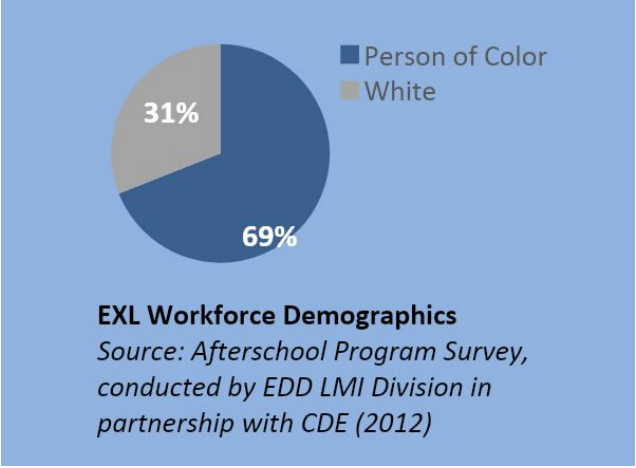Workforce Equity Screen Tool
Overarching Equity Considerations
The following questions should be considered in any decision related to policies and programming that impact the EXL Workforce:
State Level Policy, Funding, and Advocacy
The COVID-19 Workforce Advisory Group determined that EXL providers need continued direction and guidance from the CDE on grant requirements, legislation, and education code changes that impact them. Senate Bill 98 provided much-needed flexibility, allowing EXL providers to continue to support youth and families, partner with the instructional day, and keep EXL staff employed.
Staff Retention and School Day Partnerships
Pre-COVID-19, many EXL providers already faced recruitment and retention challenges. As various program structures emerge, consideration of how potential structures impact the job functions of EXL positions, and thus the existing and potential workforce, is needed. More virtual and distance learning environments could result in fewer returning staff, while some staff may not be able to provide physical programming but could utilize their skills in other areas.
Staff Emotional and Physical Safety
Ibram X. Kendi describes the nation in the midst of two crises: “a racial pandemic within the viral pandemic-older than 1896, but as new as COVID-19, and the murder of George Floyd.” Like youth and families, EXL staff may be experiencing overwhelming anxiety, stress, feelings of isolation; “survivor’s guilt”, and other traumas.
Basic Needs of Staff
Like youth and families, EXL staff may be experiencing increased hardships in securing their own basic needs including child care, housing, food security, stable internet, adequate technology devices; stable hours and income, healthcare, and home care for other residents in the home. Some staff may be wondering if and how they will complete post-secondary education, or how their or their families’ immigration status might affect their ability to access available resources.
Professional Development, Training, Skills, and Competencies
EXL must be prepared to both deal with the way programs will be restructured operationally, including but not limited to: extended hours, strict safety guidelines, and evolving reopening plans. Staff also need to be equipped with specific skills and competencies to respond to the social-emotional needs of children, youth, and their families. While many EXL providers and staff quickly moved to emergency response teaching and learning, shifting to true distance learning will also require additional training and development.








